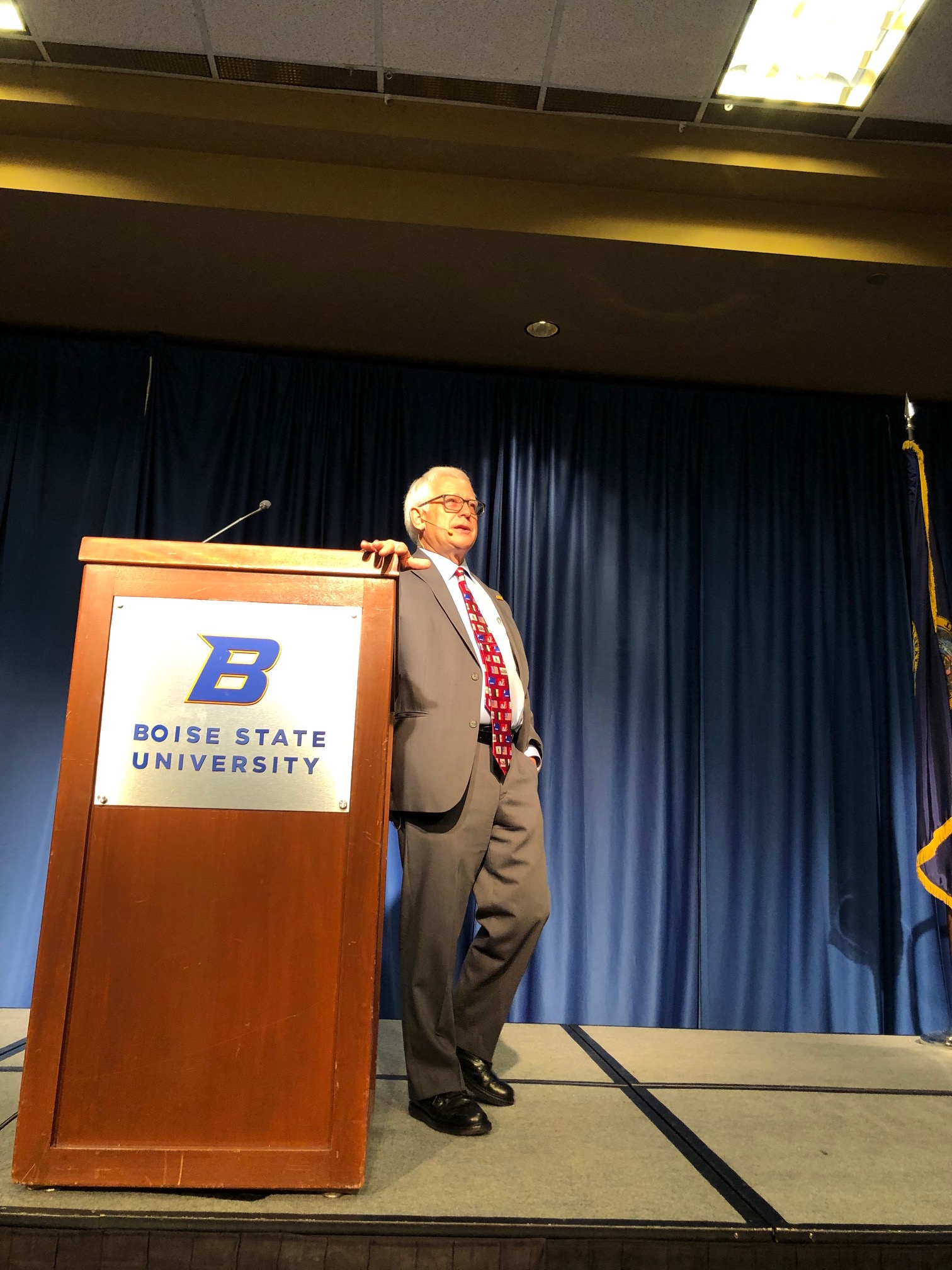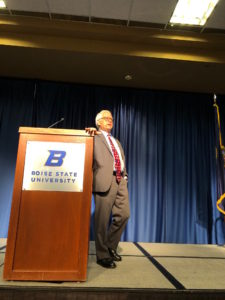

Based on my sample size, civility is alive and well at Boise State.
There has been so much discussion on line in the last few years about how hostile, and even, sometimes, violent U.S. college students have been to speakers who favor freedom. I think it’s important to right the balance by pointing out when that doesn’t happen.
I spoke at Boise State University last Monday night to an audience of about 650 people. My talk was titled “The Case for Free Trade.” After my talk, the Q&A session lasted about 50 minutes. A lot of people think that’s too long. I love it because I’m always on my game in Q&A and because I get to see what comments, questions, and criticisms people have. I got criticisms from both the right and left sides of the political spectrum.
On the right, one student suggested that we need government to give us a sense of identity. I actually thought that that comment put him on the left end of the spectrum, but one of the people in the audience who knew him told me afterwards that no, he was, expressing a conservative nationalism. Also on the right, a student listed off the various macro statistics about the economy–low unemployment, etc. I commented that he had done so correctly and agreed with him that Donald Trump should get some credit with his tax cut and his deregulation, but that the data would have looked even better without his new barriers to trade.
On the left (I think), one student correctly cited the article by MIT economist David Autor et al about the effects of trade with China on jobs in certain parts of the economy. I explained to the audience what he was getting at and then answered that even if Autor et al’s econometrics is correct–and I have no reason to think it isn’t–there will be times when trade hurts some people but if the issue is free trade or long-term high barriers to trade, virtually everyone is a gainer from free trade.
Another student asked a question that I summarized to him as “What about the tradeoff between the material and the spiritual?” and he nodded his head that I had summarized his question correctly. I replied that people should be able to make their own tradeoffs between those two things and that neither I nor any politician knew him well enough to use force to make those tradeoffs for him. I pointed out also that it is precisely because relatively free trade and a good dose of economic freedom give us so much material wealth that we are able to make tradeoffs in favor of the spiritual without even coming close to privation. I referenced a young man I had met at lunch that day whose post-graduation plan was to backpack around the world.
What I noticed in all of the Q&A without exception was how civil people were. Even the most critical and passionate questioners were polite. They didn’t jeer; they weren’t even sarcastic. Indeed, many of them led with statements such as “Thank you for coming and speaking to us.”
Final thought: Adjunct economics professor Allen Dalton was a wonderful host. Everything went incredibly smoothly and he had a huge role in that.

READER COMMENTS
Roger D McKinney
Nov 10 2019 at 7:05pm
It’s nice to see civility. I wonder if that’s the exception today? Seems like it.
I would have to agree with you that “conservative nationalism” is on the left. It’s fascism light or as Higgs calls it “participatory fascism.”
Dylan
Nov 11 2019 at 6:45am
I don’t know if it is the exception, but it doesn’t overtly surprise me very much either. I’ve spent time in Boise and some at BSU, and had a couple of friends who went there. Like most metropolitan areas, Boise leans more liberal than the surrounding areas, but those surrounding areas can be quite conservative. I also believe that BSU has a fairly high proportion of people that commute in from surrounding areas.
My guess is, given those two facts, that students are more aware that not everyone can be assumed to share their political opinions, which I’d think would lead to more civility. In some other universities I think it is easier to assume that everyone shares your view, and that can even give incentive to take a stronger stance than you otherwise would, just to look good to your peers.
Jon Murphy
Nov 11 2019 at 11:08am
I don’t think it is. We hear stories about campus disruptions precisely because they are the exceptions to the rule.
In my own experience at GMU, both as a student and a lecturer, I’ve never encountered anything but civility from students, even those who vehemently disagree with me. I’m up-front about my economic biases (free market) and I’ve taught a class with UnKoch My Campus folks in it. The class discussions were active and challenging, but never disruptive. Rather, they were very constructive.
Perhaps this is just a function of how I run my classroom (my opening statements are what the students are entitled to in the class: a break (if the class is more than 90 minutes) and respect. I give them a list of folks who they can talk to if they do not feel I am respecting them: the professor in charge of graduate lecturers (my boss), the department chair (his boss), and the dean of the college (his boss)).
But I do think most students want to engage in ideas, which is why they are going to the lecture in the first place. They want their moment to ask the question and they know the way to do that is to respect the rules of civility. Protesters are tossed out; civil-minded folks are not.
Philo
Nov 11 2019 at 10:36am
You pointed out to a questioner that “neither I nor any politician knew him well enough to use force to make those tradeoffs [materiality/spirituality—or almost anything else] for him.” One might add that for a political leader even if fully knowledgeable to force certain trade-offs on us is to disrespect our individual agency.
Jon Murphy
Nov 11 2019 at 10:55am
You’re absolutely right, but I don’t know how effective that argument might be in this particular case. I had a similar conversation with an individual and, when I brought up individual agency, they flatly stated “there is no individual agency. Only the State. We are all cells in that body and a cell does not have agency.”
Matthias Görgens
Nov 11 2019 at 9:24pm
Wow, that sounds pretty much like the definition of fashism.
But, of course, bringing that up wouldn’t be productive in a discussion. I would perhaps do a devil’s advocate and argue that “No, it’s the holy church that has agency.” (Or some other kind of large scale organisation. Eg IBM, even. IBM is bigger then some smaller countries. The Catholic church is bigger than some large countries.)
The goal would be to let your discussion partner come up with some of their own arguments against agency-only-in-a-large-organisation.
Thomas Sewell
Nov 13 2019 at 10:02pm
To be fair, about 16% of individuals in Boise explicitly profess to believe in individual agency as one of the foundations of their religion, so it’s likely one of the better locations for that particular argument. 🙂
Matthias Görgens
Nov 11 2019 at 9:32pm
David, did you argue against the state-as-provider-of-identity, or did you just declare it not relevant to the topic at hand?
I can see how the government can levy taxes and throw and Oktoberfest party, or give everyone an American flag, or finance the British NHS. Or whatever other identity providing things they want to do, but it doesn’t have much of a bearing on free trade itself.
(Of course, the kind of attitude that makes you appreciate free trade in the first place, probably also tells you that you don’t want the government to get in the identity business. But strictly speaking, that’s a separate business.)
Thaomas
Nov 12 2019 at 1:25pm
Thanks to President Trump, trade restrictions have become less popular with the left. 🙂
Comments are closed.